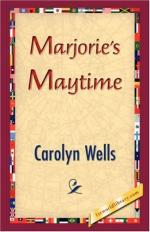With a stretch and a yawn as of great weariness, Marjorie slowly rose. Immediately the three women started toward her. “You sit still!” said one, sharply.
“Mayn’t I walk about the room, if I promise not to go out the door?” said Marjorie; “I’m so cramped sitting still.”
“Move around if you want to,” said the youngest of the women, a little more gently; “but there’s no use your trying to run away,” and she wagged her head ominously.
“Honest, I won’t try to run away,” and Marjorie’s big, dark eyes looked gravely at her captor.
The women said nothing more, and Marjorie wandered about the tent in an apparently aimless manner. But after a time she came near to a small slit in the side of the tent that served as a sort of window, and here she paused and examined some beads that hung near by. Then choosing a moment when the women were most attentive to their household duties, she put her head out through the window and yelled. Now Marjorie Maynard’s yell was something that a Comanche Indian might be proud of. Blessed with strong, healthy lungs, and being by nature fond of shouting, she possessed an ability to scream which was really unusual.
As her blood-curdling shouts rent the air, the three women were so stupefied that for a moment they could say or do nothing. This gave Marjorie additional time, and she made the most of it. Her entire lung power spent itself in successive shrieks more than a dozen times, before she was finally dragged away from the window by the infuriated gypsy women.
Marjorie turned upon them, unafraid.
“I told you I wouldn’t try to run away,” she said, “and neither I didn’t. But I had a right to yell, and if anybody heard me, I hope he’ll come right straight here! You are bad, wicked women!”
The child’s righteous indignation had its effect on the women, and they hesitated, not knowing exactly what to do with this little termagant.
And strange to say, Marjorie’s ruse had succeeded.
For when the Maynards reached Pelton, and had found the inn where they were to lunch, Pompton, the chauffeur, had expressed himself as unwilling to sit there quietly and await the arrival of King and Marjorie.
“The poor children will be done out,” he said to Mr. Maynard, “and by your leave, sir, I’ll just take the car, and run back a few rods and pick them up.”
“That’s good of you, Pompton,” said Mr. Maynard, appreciatively. “They can’t be far away now, but they’ll be glad of a lift.”
So Pompton turned the car about, and started back along the road he had just come. To his surprise, he did not meet the children as soon as he had expected, and as he continued his route without seeing them, he began to be really alarmed. He passed the halfway sign, and went nearly to the place where he had left them and had taken in the lame girl.
“There’s something happened to them,” he said to himself. “My word! I knew those children ought not to be left to themselves! They’re too full of mischief. Like as not they’ve trailed off into the woods, and how can I ever find them?”




